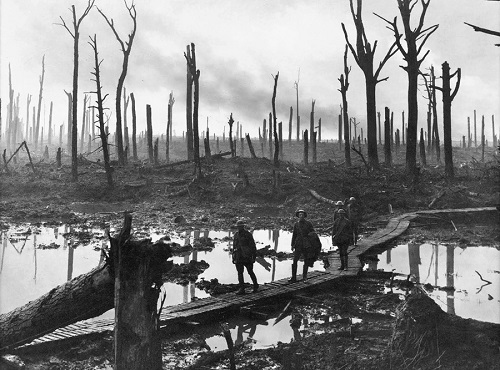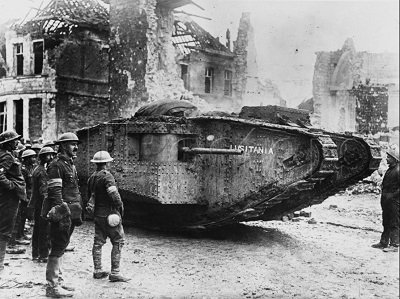
What images come to your mind when thinking of World War I? Aside from the obvious – that Battlefield 1 is a load of shite – it’s likely a series of ghoulish black and white images of battered moonscapes, lines of parading soldiers with rifles over the shoulder, and artillery-blasted towns. The Great War was rather horrific.
I’ve always been fascinated with it because it occurred in an era before photography and video was common-place. What few movie reels and photos exist are all grainy and in B/W, which can’t help but colour [1] my view of events. It seems so alien to modern life, despite ending only 100 years ago.
Gary Sheffield’s Forgotten Victory was a 2001 attempt to replace what he considered myths of WWI with the results of modern scholarship, aimed at the general public. He thus begins with a long chapter surveying the general public attitude to WWI and how it got that way. The war is generally considered futile, sparked by the little incident in Sarajevo of Serb anarchists assassinating heir to the Austro-Hungarian throne Archduke Franz Ferdinand. Various treaty obligations cascaded into mutual declarations of war until the entire continent was aflame. Many millions of needless deaths later, the war ended for equally spurious reasons. The whole thing was a massive waste of time, a sick spectacle of the British ruling class sacrificing the flower of British youth into the meat-grinder of the Western Front.
The kind of attitude seen in Blackadder Goes Forth.
Well, as any red pill reader is aware, the fact that comedy was made by the Bolshevik Broadcasting Corporation should be a big red flag. As should be any consensus view emerging from the Socialist indoctrination centres we now call public schooling. There’s a foul odour of Marxism that reeks from the consensus view, of “lions led by donkeys”, and the imagery of Field Marshalls in luxurious castles behind the lines, while infantry men live in dirty flooded trenches.
Sheffield argues persuasively that this negative nihilistic view of WWI was constructed long after the war ended, and didn’t really surface at all until the 1930s. Much of the anti-war narrative was crafted by scholars of English literature not History (or military history in particular) who relied upon the same tiny selection of anti-war poems and memoirs written by upper-class literati such as Wilfred Owen or Robert Graves. During the war, spirits were high and the British public supported war aims. The first two decades of post-war writing and performance were pro-war or at least ambivalent.
The idea that Britain should be ashamed of its involvement in WWI is a construction of historical engineers.
So, what are some of the myths that Sheffield wishes to bust? Now, I’m no scholar of WWI so I can’t give an informed opinion on whether he has successfully debunked them, but the evidence he presents is certainly coherent in doing so, with what is presented.

It’s a long way from Warsaw Modlin airport to the city centre
Myth #1 – Germany was unfairly blamed for starting the war.
Kaiser Wilhelm II was literally insane and surrounded himself with yes men. The German constitution gave him unlimited power and no real opposition from a toothless Reichstag. Given grand ambition, he set about undoing the careful neutrality established by Bismarck, aiming to establish Germany hegemony over Europe. High in his priorities was creation of a large modern navy intended to rival Britain’s. This completely upset the balance of power and forced Britain to respond.
When Franz Ferdinand was assassinated that didn’t need to lead to war, but German egged on the Austro-Hungarian empire to attack Serbia. It was also the Germans who kicked off war on the Western Front by invading Belgium.
Myth #2 – The Versaille Treaty was unfair, and led to WWII
Considering that Germany started the war and was spectacularly brutal in the occupied lands, it’s no surprise there was a victor’s peace. Much UK and French commentary in 1919 was that the Germans had been let off too lightly by the treaty. Their army never officially surrendered and was allowed to march back to Germany territory in full battle order and even march through German towns in a victory parade. The country – which was only united in 1871 – was never broken back up into its principalities. Foreign troops never occupied it.
By the time Hitler began rising to power, most of the conditions of the treaty had been eliminated or resolved in Germany’s favour as Britain, France, and USA constantly back-tracked and failed to enforce it. France never received the majority of the $600m in war reparations demanded by the treaty.

Ghoulish and fascinating, imo
Myth #3 – Britain should have never sent a land army to the Western Front
Germany made straight for the ports of Belgium which, since Elizabeth 1st’s time, have always been the outer line of Britain’s defence. Seizure of ports on the channel would directly threaten the British mainland and substantially weaken control of the Channel. It was in the north that the British Expeditionary Force fought, holding the Germans back long enough for France to regroup, and holding down German divisions to stop them being sent to the Eastern Front where Russia was close to an early collapse.
According to Sheffield, in the desperate first year of war, Germany would’ve won if the BEF hadn’t become directly involved in the land war and then German occupation of channel ports would’ve put Britain under serious threat from an aggressively expansionist Germany that would’ve almost certainly used them to begin a war with Britain anyway (had we stayed out of the land war). It was a case of fight them now, or fight them later when they are even stronger.
Myth #4 – The generals were dummies, carelessly wasting soldier’s lives.
This gets a very detailed treatment in the book. One surprise for me was learning about command and control problems. The reason Douglas Haig stayed in his chateau was due to the nature of the telephone lines – he was more use there, as he could get an overall battle picture far faster than if he was close to the front lines. WWI was before radios were useful in battle. He often did go close to battle when opportunity allowed, including setting up his control centre in a railway carriage for one campaign.
Sheffield argues that the generals did a reasonable job but were faced with a formidable learning curve fighting a war of a scale and type that had no precedent. 1914-15 was a period of mistakes which were learned from and tactics changed considerably until by 1917 the BEF was a highly skilled fighting force with effective techniques of breaking German lines. Many of the “futile” battles in common lore were actually successes.
I’m only dipping into Sheffield’s claims here but it was fascinating to me. There were so many elements to the war that I’d never considered until now. It’s also an object lesson to never believe what the Marxists tell you. They’d made a huge effort to rewrite WWI into the standard bourgeoisie vs proletariat class warfare narrative.
I have never dressed in uniform and took a rifle into Europe to fight the Bosch, but I have dressed like a rocknrolla and took my daygame there to clack birds. Read all about it here.

[1] Excuse the pun

